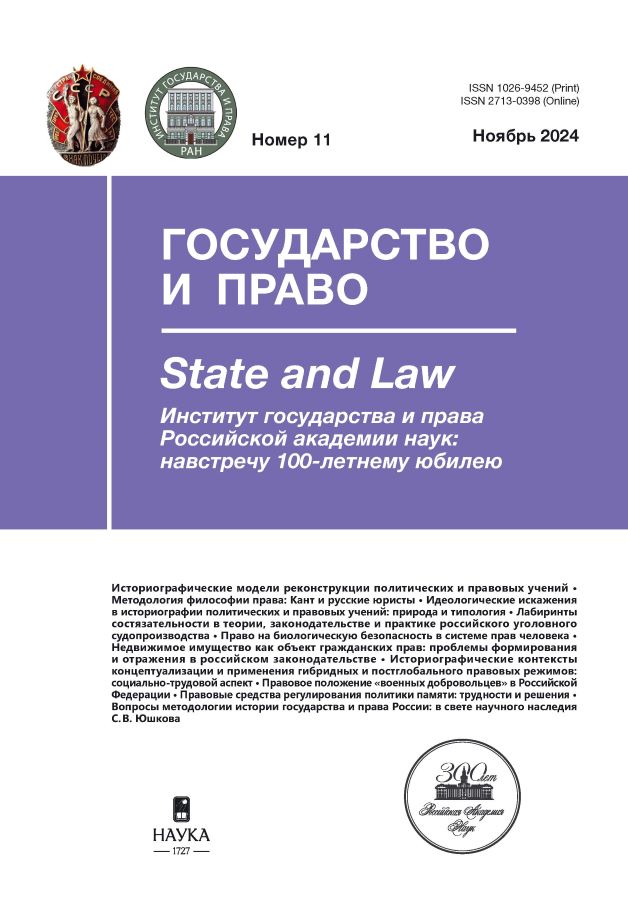Legal means of regulation of memory policy: difficulties and solutions
- Autores: Kolotova N.V.1
-
Afiliações:
- Institute of State and Law of the Russian Academy of Sciences
- Edição: Nº 11 (2024)
- Páginas: 174–183
- Seção: Abroad
- URL: https://bioethicsjournal.ru/1026-9452/article/view/649059
- DOI: https://doi.org/10.31857/S1026945224110154
- ID: 649059
Citar
Resumo
The article raises the question of whether legal means to resolve issues related to memory policy are appropriate in order to build a social and political consensus around memories of the past related to national identity. Based on the experience of legislative regulation of memory policy in Spain, as well as individual examples of judicial decisions of the European Court of Human Rights, the difficulty and sometimes futility of attempts to separate purely legal issues from the complex historical evolution of the situation under consideration is shown.
Texto integral
Sobre autores
Natalia Kolotova
Institute of State and Law of the Russian Academy of Sciences
Autor responsável pela correspondência
Email: kolotova.n@gmail.com
PhD in Law, Associated Professor Leading Researcher, Acting Head of the Sector of Human Rights
Rússia, 10 Znamenka str., 119019 MoscowBibliografia
- Veltser Kh. Memory as an arena of political struggle // Inviolable reserve. 2005. No. 2. URL: https://magazines.gorky.media/nz/2005/2/istoriya-pamyat-i-sovremennost-proshlogo.html (in Russ.).
- Galperin M. Politicization of law or legalization of politics? On justibility and the doctrine of the “political question” // International Justice. 2020. No. 4 (36). Pp. 45– 58 (in Russ.).
- Grantseva O. E. The Law on the Democratic Memory of Spain: an attempt at consolidation or a new phase of conflict? // Latin American Almanac. 2022. No. 36. Pp. 78, 109 (in Russ.).
- Evseev A. P. Political justice: essence, genesis, evolution // Herald of the SPbU. Law. 2020. No. 1. P. 240 (in Russ.).
- Evseev A. “Working out the past”: the complexity of judicial cognition // International Justice. 2017. No. 4 (24). Pp. 126, 128 (in Russ.).
- “Ilascu and others against Moldova and the Russian Federation” // International Justice. 2013. No. 1 (5). P. 78 (in Russ.).
- Przyban I. The diversity of models of transition from authoritarianism to democracy // Society and law: research perspectives: collection of articles / ed.-comp. A. Kondakov. Spb., 2015. Pp. 169, 179 (in Russ.).
- Khenkin S. M. Spain: polemics around historical memory // Contours of global transformations. 2019. Vol. 12. No. 4. Pp. 73, 76, 79 (in Russ.).
- Charnota A. Law, memory and oblivion: regulation of collective memory by quasi-judicial institutions // Society and law: research perspectives: collection of articles / ed.-comp. A. Kondakov. SPb., 2015. Pp. 187, 194, 198, 206, 207 (in Russ.).
- Aguilar P. The Spanish Amnesty Law of 1977 in Comparative Perspective: From a Law for Democracy to a Law for Impunity n book: Amnesty in the Age of Human Rights Accountability. Publisher: Cambridge University Press. Pp. 315–335.
- An Introduction to Transitional Justice / ed. by O. Simie. London, 2021. Pp. 1–14.
- Davis M. Is Spain Recovering its Memory Breaking the Pacto del Olvido // Human Rights Quarterly. 2005. Vol. 27. Iss. 3.
- Encarnación Omar G. Democracy Without Justice in Spain: The Politics of Forgetting. Philadelphia, 2014. P. 256.
- McDonough P., Bares S., Pina A. L. The Cultural Dynamics of Democratization in Spaine. Ithaca, 2018. Pp. 5–9.
- Osiel M. Mass Atrocity, Collective Memory and the Law. 2017. 2ed. London, 1997. Pp. 4–10.
- Van-Halen J. Memoria democratica Europea. URL: https://www.almendron.com/tribuna/memoria-democratica-europea/ (accessed: 27.07.2024).
Arquivos suplementares










